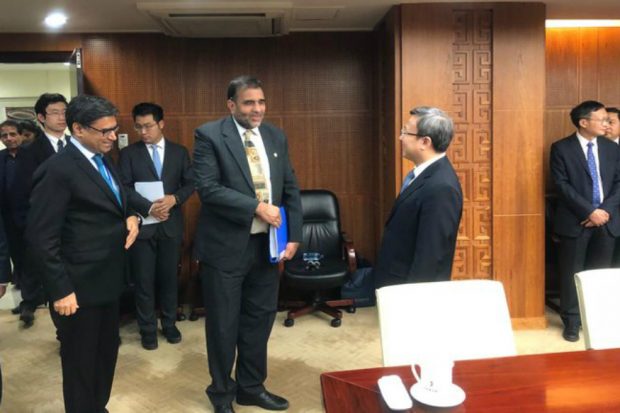
India asks RCEP members to address causes of trade imbalances
PTI, Aug 4, 2019, 11:12 AM IST

New Delhi: India has told China that the proposed mega free trade agreement RCEP should address the causes of high trade imbalances among the member countries, the commerce ministry said on Saturday.
The matter was among the issues raised by Commerce Secretary Anup Wadhawan in his meeting with Wang Shouwen, the Vice Minister of China’s Commerce Ministry, on the sidelines of RCEP inter sessional ministerial meeting in Beijing on Friday.
A joint statement issued after the two-day RCEP ministerial meeting said that the ministers noted that over two-thirds of market access negotiations have reached mutually satisfactory outcomes, and that work on the remaining areas are being intensified through constructive engagements at all levels.
Determined to keep the momentum towards achieving the Leaders’ mandate to conclude the RCEP negotiations by the end of the year, the ministers “called on all members to find pragmatic and solution-oriented approaches to narrow divergence on the various remaining issues”, the statement said.
Covering 47.4 per cent of global population, 32.2 per cent of the global economy, 29.1 per cent of global trade, and 32.5 per cent of global investment flows in 2018, the ministers emphasised that RCEP is the most important trade agenda in the region, supportive of an open, inclusive, and rules-based trading system, and an enabling trade and investment environment, it said.
RCEP bloc comprises 10 ASEAN group members (Brunei, Cambodia, Indonesia, Malaysia, Myanmar, Singapore, Thailand, the Philippines, Laos and Vietnam), and their trade partners India, China, Japan, South Korea, Australia and New Zealand.
India has registered a trade deficit in 2018-19 with as many as 11 RCEP member countries – including China, South Korea and Australia – out of the grouping of 16 nations that are negotiating a mega trade pact since November 2012.
In 2018-19, India’s trade deficit with China stood at USD 50.2 billion. “India’s concerns regarding market access and other issues leading to imbalanced trade between some of the partner countries was specifically flagged during the meetings,” the ministry said.
The secretary also raised bilateral trade issues with the Chinese minister. India has sought greater market access from China for its products like sugar, rice and pharmaceuticals to narrow the high trade deficit.
He also pushed for greater market access to other items such as milk and milk products, pomegranate, soybean meal, and okra. Besides, he asked for easing of the business visa regime by China for Indians.
In his meeting with Boonyarit Kalayanamit, Permanent Secretary of Thailand, the Secretary requested Thailand to improve its offer in goods and services under RCEP.
With Chan Chun Sing, Minister for Trade and Industry of Singapore, Wadhawan requested to support the operationalisation of the mutual recognition agreement on nursing as agreed in the 2nd CECA, a kind of free trade agreement, review and work towards speedy progress on the 3rd CECA review.
Udayavani is now on Telegram. Click here to join our channel and stay updated with the latest news.
Top News

Related Articles More

Sony India bags ACC media rights for eight years

Musk says X now top news app on App Store in India

Air India to offer integrated aircraft maintenance engineering programme

Markets stage sharp recovery; Sensex reclaims 79k level, Nifty surges 557.35 points

Baku climate talks: The ‘X’ factor that could determine future of Global South
MUST WATCH
Latest Additions

Air pollution: SC flags Delhi govt’s failure to implement GRAP-4 curbs on entry of trucks

Drugs worth Rs 6 crore seized in Bengaluru, five arrested

Siddaramaiah urges Nirmala Sitharaman to address NABARD’s loan cuts to farmers

Satwik-Chirag enter semifinals, Lakshya loses to Antonsen in China Masters

BJP stages protest against Congress govt in Karnataka over Waqf properties row
Thanks for visiting Udayavani
You seem to have an Ad Blocker on.
To continue reading, please turn it off or whitelist Udayavani.





















